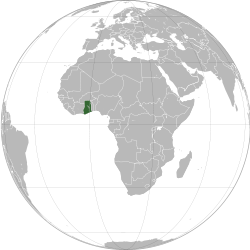Ghana (Commonwealth realm)
| Ghana | ||||||||||
| Commonwealth realm | ||||||||||
|
||||||||||
|
||||||||||
|
Motto "Freedom and Justice" |
||||||||||
|
Anthem God Bless Our Homeland Ghana |
||||||||||
| Capital | Accra | |||||||||
| Languages |
English Akan |
|||||||||
| Government | Constitutional monarchy | |||||||||
| Queen | ||||||||||
| • | 1957–1960 | Elizabeth II | ||||||||
| Governor-General | ||||||||||
| • | 1957 | Charles Noble Arden-Clarke | ||||||||
| • | 1957–1960 | Lord Listowel | ||||||||
| Prime Minister | ||||||||||
| • | 1957–1960 | Kwame Nkrumah | ||||||||
| Legislature | National Assembly | |||||||||
| Historical era | Cold War | |||||||||
| • | Independence | 6 March 1957 | ||||||||
| • | Republic | 1 July 1960 | ||||||||
| Currency | BWA pound (1957–1958) Ghanaian pound (1958–1965) Ghanaian cedi (1958–1965) |
|||||||||
|
||||||||||
Ghana was a Commonwealth realm between 6 March 1957 and 1 July 1960, before it became the Republic of Ghana. It was the first western African country to achieve independence.
British rule ended in 1957, when the Ghana Independence Act 1957 transformed the British Crown Colony of the Gold Coast into the independent sovereign Commonwealth realm of Ghana. The British monarch remained head of state, and Ghana shared its Sovereign with the other Commonwealth realms. The monarch's constitutional roles were mostly delegated to the Governor-General of Ghana. The royal succession was governed by the English Act of Settlement of 1701. The following governors-general held office in Ghana during the commonwealth realm period:
A referendum was held on 27 April 1960, with 88.47% percent of the Ghanaian people (that voted) voting in favour of a republic, and 11.53% against. The republic was declared and the monarchy abolished on 1 July 1960.
Elizabeth II did not reside in or visit Ghana between 1957 and 1960, but she did visit:
Kwame Nkrumah held office as prime minister (and head of government). Following the abolition of the monarchy, a presidential election was held, which Nkrumah won, and subsequently he became the first President of Ghana.
...
Wikipedia



